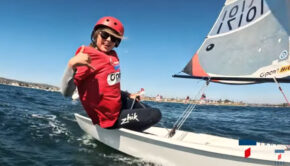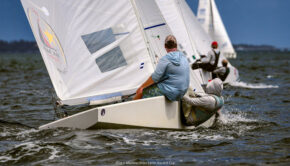How sailing benefits from progress
Published on August 28th, 2023
Hungarian Istvan Rujak, an ex-Olympic sailor (Finn, 1980) and national champion in five different Classes, shares the kind of wisdom only time provides:
I love the traditional boats, I love more tactical, slow racing and I do sail a lot with cruisers on lakes and sea as well. Even so, I also appreciate how we benefit from the larger picture.
The most modern sailing boats, foilers and extreme racing machines are just the tip of the iceberg. The main public attention is always directed to modern, new things, but generally the boating life goes with more traditional tools. Even racing is the same, as we, non-professional sailors, do race mostly in traditional classes and boats.
Fewer people compete than 25-50 years ago – that’s a fact – with the main reason to be found elsewhere not in the sailing life. Our whole life has accelerated abnormally and people have no time for living.
In the past, a national championship lasted 7-10 days and the weekend competitions started on Friday. Nobody can do that today. Neither those who sail with dinghies nor those who sail with cruisers. We run after nonsense. Meaningless values have become too important in our everyday lives. Modern boats can’t do that, only we humans can.
The most advanced racing boats are important as they attract the attention of non-sailors. More so, the boatbuilding industry is developing and designers while boat builders know more and more. The most useful improvements also affect cruisers too.
After all, today’s modern cruisers are much easier to drive compare to boats designed 40 years ago. That means they are safer, but also more spacious, not to mention how boats are getting lighter and stronger thanks to the use of more and more modern materials.
We may ask, what is DSS for, what are foiler boats for? What are their uses in general? Well, for example, would there be foiling motorboats, or even ships faster and more environmental friendly if this idea was not developed by the competitors?
This has always been the case, just the pace is accelerating here, as it is happening all in our lives.
In the nineteenth century, there were the schooners as the quickest sailing boats. If you put more sails on them to speed up, they would capsize. Therefore, they had to be built wider, but then they did not become faster. Who invented the solutions? Those great minds who design and build racing boats.
Along came Burgess, Herreshoff, and other great sailors. The long keel was developed, then the fin keel, etc… They started using lighter and stronger materials and what they learned in racing boats was used in cruiser or dinghy construction as well.
In response to widening schooners and clumsy yachts, the young Nat Herreshoff invented the catamaran and built the Amaryllis. He really beat opponents who sailed traditional ships. As a consequence multihulls were banned from competitions for a long time, because the sailors living at that time could not accommodate the excessive development.
But if there weren’t those developments, which were too fast for many sailors anyway, would our cruisers or day sailors be the way they are today? The way we love them. What would our boats, considered average and generally accepted today, be like without the previous developments encouraged by competitors? Without what many thought were excessive developments at the time.
In itself, commercial or everyday sailing, which strives for safety and accepts just slow innovation, would not have developed at such a pace in the last 200 years without racing and the desires of the competitors. Those who did not care about the costs, did not calculate the utilization rate, but always dreamed of a newer, better, faster sailboat.
There’s no real reason to blame anybody else how our life evolves. Everybody has to find its own satisfaction on its own way, in its own lovable community. As long as it is possible, that’s fine. We have to claim against such phenomenon which ruins our own life. There are many of that but not those sailors who are seeking for a faster boat.
Racing boats and racing sailors were and still are the tip of the iceberg. We are inside a bit frozen into our old ideas. They stick out of the water. After all we breathe through them.









 We’ll keep your information safe.
We’ll keep your information safe.